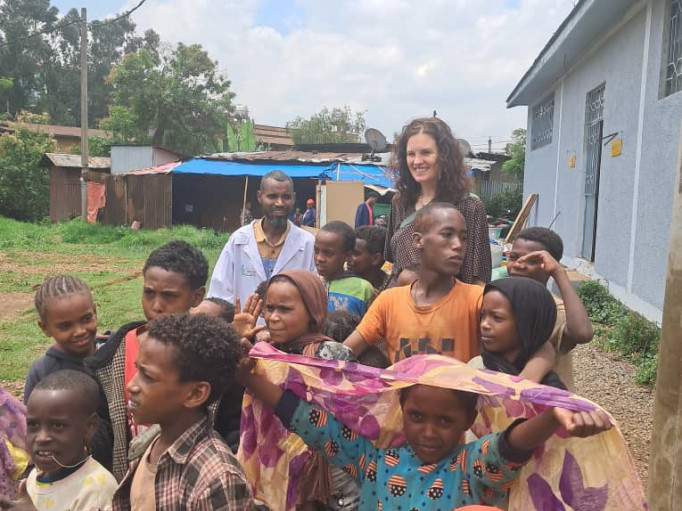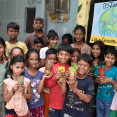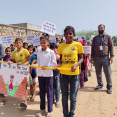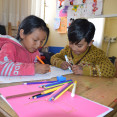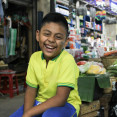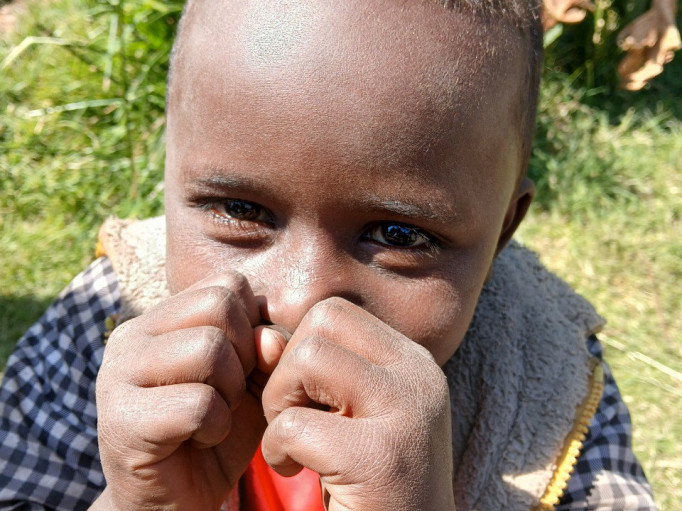
Toybox's Director of Impact and Programmes, Naomi Hall Opiyo shares a personal reflection on the difference the Toybox supported Hope for the Streets education project is making in the lives of street children in Ethiopia's capital, Addis Ababa.
initial apprehension and uncertainty
In May, I had the privilege of returning to visit our newest partner CHADET and to see how the education project was progressing. I'd previously visited in September 2024 shortly after the project began. At that time, for many of the children, it was their first experience being in any kind of school setting; and for others, the first return to education after several years. The majority of the children had migrated from other parts of the country (primarily Amhara, Oromia and Tigray) fleeing conflict, natural disasters, economic hardship and in some cases, child marriage. Amidst the excitement of finally having the opportunity to learn, it was clear that adjusting to a school setting - even an informal one - was going to take some adjustment. There was also a sense of apprehension - not only about learning, but also where they would sleep that night. Many of the older boys showed signs of substance abuse (with some concealing bottles of glue in their sleeves for a quick hit). Hygiene and behaviour was also a challenge.
a visible change
Now, nine months on, the change in atmosphere was immediately apparent. As soon as I stepped foot into the centre compound, I was greeted by smiles on children’s faces. Some were enthusiastically playing football on an unused area of land transformed into a football pitch, and others were enjoying using playground equipment, donated by the local council.
Pictured below: The football pitch at the education centre (left). Two participants in the project (right).
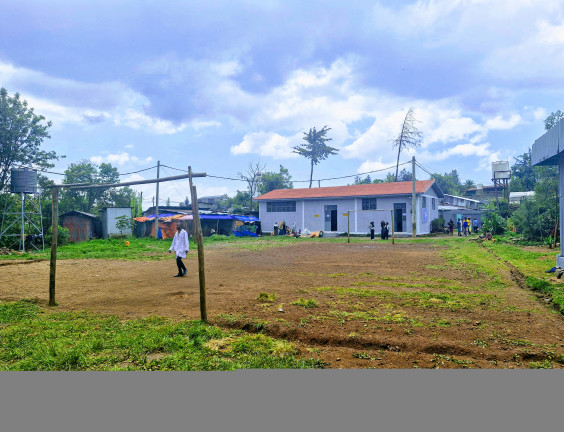
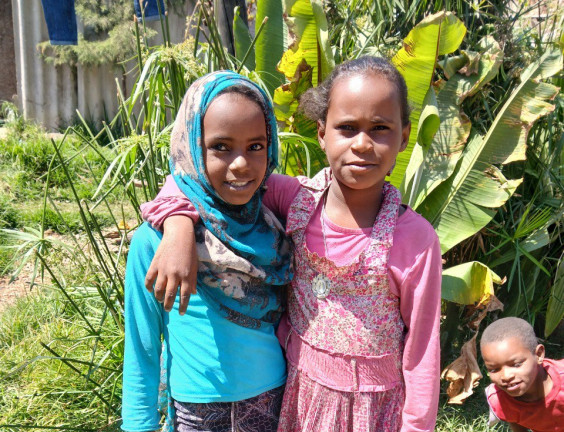
In addition to the daily lessons in numeracy and literacy (Amharic and English), the centre also provides access to computers for learning basic IT skills. There's also a dedicated 'social and emotional learning' component. These sessions offer children a break from formal learning and give them a chance to express themselves through writing, talking, drawing, or singing about the challenges they face. They also create opportunities for the children to have fun, build friendships with peers, and form supportive connections with the staff. There is an onsite counsellor who sees children individually and in groups - building trust and supporting them with issues such as self-esteem and anger.
Access to nutrition and promoting hygeine
A simple kitchen has been set up on-site, and the children now receive two meals a day at the centre. These meals encourage attendance, giving them the energy and nutrition to learn and stay healthy. Previously many of these children would have been on the streets selling items like sweets, chewing gum, or tissues or helping their parents beg for food. While attending classes at the centre doesn’t completely stop them from engaging in such activities, as they still face financial pressures, the more time they spend away from the unsafe streets, the lower their risk of abuse, exploitation, and harassment by the police.
Toybox's partner CHADET has also installed toilets and showers. Very few of the children attending the centre have a permanent place to stay and so have limited options for bathing and storing spare clothes. These low levels of hygiene mean that children are at risk of skin infections and other health issues. Sleeping on the streets is illegal in Ethiopia but with nowhere to call home, they club together small amounts of money with their friends to pay for a small patch of “floor” or sleep with a parent under a simple street stall used for selling during the day. Now children have showers twice a week at the centre. which has really improved hygiene.
Pictured below: (L) A project participant draws during a social and emotional learning sesison. (R) Project partipants inside the classroom.
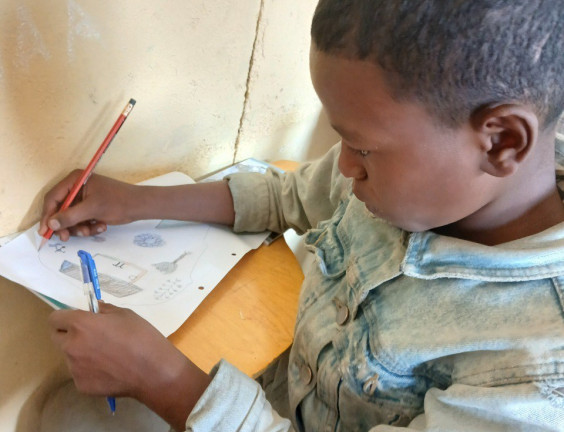
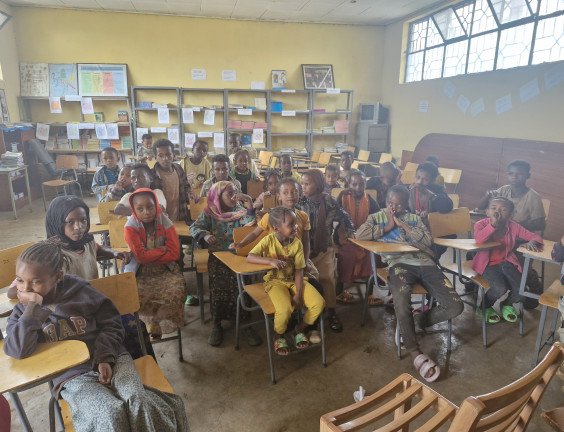
Creating real and lasting change
A 2022 Study by Kotebe University and BOLSA in Addis Ababa states that 60,714 children live and work on Addis’ streets, although the actual number is known to be much higher than this - especially given high levels of migration to the city due to conflict. Most are located in the very area that Toybox's partner is working through the education centre.
Even more staggering is the national picture: nine million Ethiopian children are currently out of school (over 35% of school age children) - many caught in the crossfire of armed conflict, natural disasters, tribal tensions and economic hardships. In the region of Amhara - most affected by conflict- only 33% of school aged children were able to enrol in school in 2025. This will have devastating consequences for years to come.
Even in the face of this immense challenge, real and lasting change is underway. Toybox is currently supporting 85 children at the centre and a further 134 children attending formal school. These may seem like small numbers against the scale of national need, but for each and every one of these children, the impact is life-changing. And we're not stopping here. We will shortly be scaling up provision to reach even more children - including some of the most vulnerable who desperately need the opportunity.
Growing confidence and shifting behaviour
While I was at the centre, I spoke to a group of children - including a couple I recognised from my previous visit. As I began addressing them with my Amharic translator by my side, I was amazed to hear some of them responding in English even before the translator had a chance to speak! They answered with big smiles and such confidence. Just nine months earlier they had been extremely shy and didn’t know any English words. Even Amharic had been challenging for many of then as they had migrated from other parts of the country where school was conducted in the local language.
I looked through their books and was really impressed at their scores. Speaking with the teachers, they highlighted a major shift in behaviour. In the beginning there was a lot of fighting, often because it was one of the only ways children knew how to communicate. But over time, trust has been built, safe boundaries set and the children have truly thrived. Substance abuse is no longer happening on site and positive foundations have been laid. As we prepare to adapt and scale up the project after this initial pilot, I can’t wait to see how the children continue to progress and to expand the impact through the wider work with parents, schools and communities.
Pictured below: Naomi stands with some of the children attending the Toybox-supported education project in Addis Ababa.
